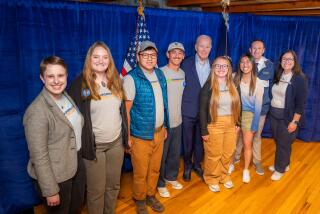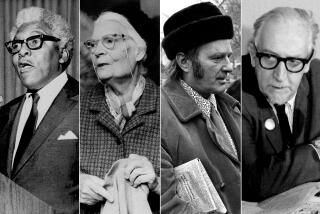25th Anniversary of Founding : Peace Corps Veterans Recall Experiences
- Share via
Mark Winston and Ron Pachence were both 22 when they volunteered for the Peace Corps. Both had just received their bachelor’s degrees and were attracted by a sense of adventure and a desire to help others.
Pachence entered the Peace Corps in 1967, when many young people were still motivated by the idealism that had prompted the founding of the organization six years earlier. Winston volunteered in 1981, at a time when many of his contemporaries seemed to value career enhancement over cultural enrichment.
The two are among a group of students, faculty members and alumni of the University of San Diego who have served in the Peace Corps and are being brought together this month to commemorate the organization’s 25th anniversary. Winston is a graduate student majoring in political science. Pachence is an ordained Roman Catholic priest who teaches in the religious studies department.
The Peace Corps was born in 1961 out of the Kennedy Administration’s belief that the energies of idealistic young people could be harnessed to help bring American affluence and influence to the Third World. Despite changing political times, the organization remains popular with young people, with more than 14,000 annually applying to spend two-year stints in developing nations.
The Peace Corps has survived by adapting its services to satisfy volunteers who want their Peace Corps experience to enhance their employability and host countries that demand volunteers with more technical expertise. And while Pachence and Winston reflect some of these differences, their memories of the two years they spent abroad are strikingly similar.
“Those were still the years of great idealism, coming off the Kennedy years,” said Pachence, 41, who left a Missouri seminary to teach English in Kadikoy, Turkey. “A lot of us were looking for alternatives to the Vietnam War and we found (the Peace Corps) a great way to serve without being involved in military service. Unfortunately, our draft boards didn’t see it that way.”
For Winston, 27, who spent two years working to improve farming methods used by village agricultural cooperatives in the African nation of Mauritania, the appeal was part humanitarian concern, part youthful wanderlust.
“Even in today’s world, when things are going well economically, there’s still a certain percentage of the population that feels dissatisfied,” Winston said. “I felt I was so lucky, I had been well-educated and I thought it was almost unfair of me not to share it with someone else.”
After deciding to dedicate two years of their lives to volunteer service, both Winston and Pachence had to make it through a lengthy screening process that included personal interviews, numerous character references and a check of their backgrounds by the FBI.
Today, as in the ‘60s, the majority of Peace Corps applicants are not accepted. And whereas Pachence, a philosophy major, was assigned to teach English as a second language, modern-day applicants such as Winston, a political science graduate student specializing in international marketing, must usually have a background in agriculture, construction or business to be accepted.
“The liberal arts major does have a much harder time getting in,” said Rick Mead, area manager of the Peace Corps recruiting office in Los Angeles. “The English as a foreign language program is much smaller than it has been because speaking English is not something that’s required to sustain life. We still look for people with liberal arts backgrounds, but they have to have something on top of that.”
Once in their host countries, volunteers must often scale down their expectations, Mead said. Pachence said this was especially true of his contemporaries.
“We all had this idealism that we were going to change the world and all that stuff,” Pachence said. “All that changed after about a month. People who thought they were going to change Turkey weren’t happy very long.”
Winston said he avoided this problem by not having any preconceptions of what his host country would be like. Nonetheless, he found himself not completely prepared for what he found.
“I’d seen poverty before, but I’d never seen that kind of desolation,” Winston said of Mauritania, in northwestern Africa. “It’s one of those countries that straddles the Sahara and there’s just hundreds and hundreds of miles of nothing.”
Winston said he knows of some Peace Corps volunteers who had a great deal of trouble adjusting to their new surroundings, but that this was not a problem for him.
“I was having too much fun to think about it,” he said. “Everyday, you’re doing new things or meeting new people. Everyday, you learn another 10 words in the language or learn how to tell a joke.”
Both Winston and Pachence reported that their years in the Peace Corps substantially changed their lives. For Winston, they provided the opportunity for him to meet his fiancee. For Pachence, who had been raised a devout Catholic, they enabled him to experience life in a Muslim country.
“Turkish law forbade us to say anything about religion,” Pachence said. “While none of us went there to proselytize, you had to be very careful about what you said . . . If a student came up to you after class and asked you to tell him about Christianity, you couldn’t do it . . . And this is in Turkey, which is probably one of the most liberal and democratic countries in the Middle East. It really made me appreciate the freedom of expression we have here.”
But although both had to adapt to different social customs and mores, both praised the hospitality of their hosts.
“We took a trip to eastern Turkey and we went out to this village that was a real mud huts kind of place,” Pachence recalled. “They took us in and gave us dinner, which is the highest honor you can pay someone there. They fed us chicken, which is a very great sign of respect, since they rarely eat meat in these villages.”
Members of the Peace Corps are not volunteers in the truest sense, Mead said, since they receive a monthly stipend while abroad (currently between $200 and $300) and “readjustment compensation” when they return.
But, Mead said, today’s prospective volunteers usually demand more than the chance to enjoy the experience of a lifetime before agreeing to live two years without running water.
“People are a little more interested in ‘What is it going to do for me after Peace Corps,’ ” Mead said. “They’re more concerned with how it’s going to enhance their career opportunities.”
Mead added that a background in the Peace Corps can be of great value for those pursuing careers in foreign service or international business.
And Pachence, who as a religious studies professor at USD occasionally counsels students who are considering applying for the Peace Corps, offers a few caveats to the prospective volunteer.
“It’s not the least bit romantic when you’re doing it; it’s very romantic in hindsight,” he said. “There were days when I hated it, but on the balance it was a very good experience. But I know people who had a rotten time.
“I’d say that if someone has a real messianic complex--they’re going to save Uganda or whatever--then I’d tell them to think twice about it.”
The University of San Diego is marking the 25th anniversary of the Peace Corps with a Sept. 30 reunion of alumni who are also returned volunteers. Those interested should contact Judy Rauner, the university’s director of volunteer programs.


